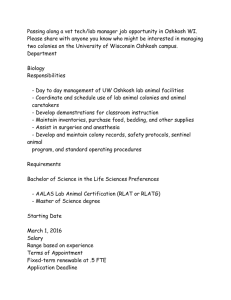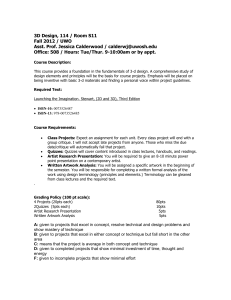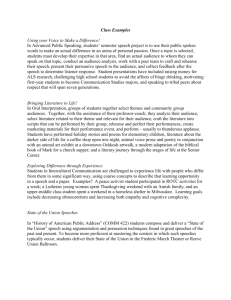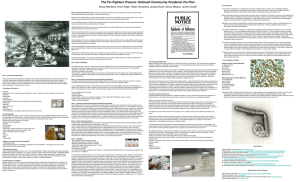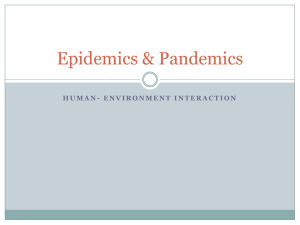Poster - University of Wisconsin Oshkosh
advertisement
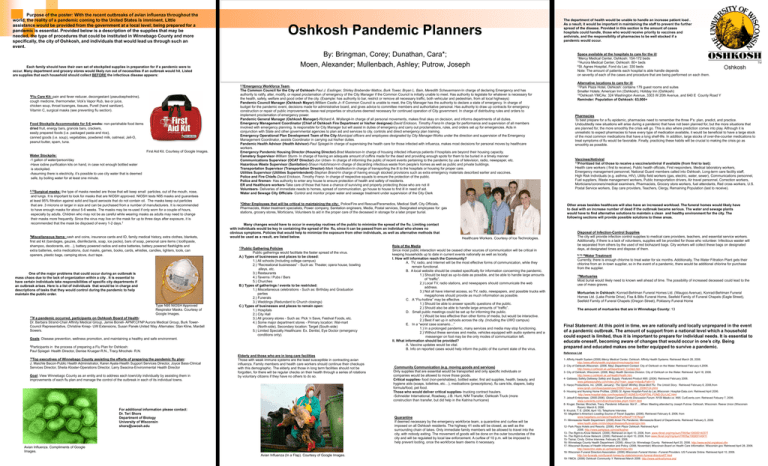
Purpose of the poster: With the recent outbreaks of avian influenza throughout the world, the reality of a pandemic coming to the United States is imminent. Little assistance would be provided from the government at a local level; being prepared for a pandemic is essential. Provided below is a description of the supplies that may be needed, the type of procedures that could be instituted in Winnebago County and more specifically, the city of Oshkosh, and individuals that would lead us through such an event. Oshkosh Pandemic Planners By: Bringman, Corey; Dunathan, Cara*; Moen, Alexander; Mullenbach, Ashley; Putrow, Joseph Each family should have their own set of stockpiled supplies in preparation for if a pandemic were to occur. Many department and grocery stores would likely run out of necessities if an outbreak would hit. Listed are supplies that each household should collect BEFORE the infectious disease appears: 2,3Emergency 5Flu Care Kit: pain and fever reducer, decongestant (pseudoephedrine), cough medicine, thermometer, Vick’s Vapor Rub, tea or juice, chicken soup, throat lozenges, tissues, Purell (hand sanitizer), Vitamin C, surgical masks (see preventing flu section). Food Stockpile-Accommodate for 5-6 weeks: non-perishable food items dried fruit, energy bars, granola bars, crackers, easily prepared foods (i.e. packaged pasta and rice), canned goods (i.e. soup), vegetables, powdered milk, oatmeal, Jell-O, peanut butter, spam, tuna. First Aid Kit. Courtesy of Google Images. Water Stockpile: -1 gallon of water/person/day -Have iodine purification kits on hand, in case not enough bottled water is stockpiled. -Assuming there is electricity, it’s possible to use city water that is deemed safe, by boiling water for at least one minute. 4,10Surgical masks: the type of masks needed are those that will keep small particles, out of the mouth, nose, and lungs. It is important to look for masks that are NIOSH approved. NIOSH tests N95 masks and guarantees at least 95% filtration against solid and liquid aerosols that do not contain oil. The masks keep out particles that are .3 microns or larger in size and can be purchased from a number of manufacturers. It is recommended to have enough masks for about 5-6 weeks. The masks may be re-used if only worn for a couple of hours, especially by adults. Children who may not be as careful while wearing masks as adults may need to change their masks more frequently. Since the virus may live on the mask for up to three days after exposure, it is recommended that the mask be disposed of every 1-2 days.7 5Miscellaneous Items: cash and coins, insurance cards and ID, family medical history, extra clothes, blankets, first aid kit (bandages, gauzes, disinfectants, soap, ice packs), bars of soap, personal care items ( toothpaste, shampoo, deodorants, etc…), battery powered radios and extra batteries, battery powered flashlights and extra batteries, extra medications, dust masks, games, books, cards, whistles, candles, lighters, tools, can openers, plastic bags, camping stove, duct tape. One of the major problems that could occur during an outbreak is mass chaos due to the lack of organization within a city . It is essential to have certain individuals take responsibilities of specific city departments if an outbreak arises. Here is a list of individuals that would be in charge and descriptions of tasks that they would control during the pandemic to help maintain the public order. Type N95 NIOSH Approved Respirator Masks. Courtesy of Google Images. 17If a pandemic occurred, participants on Oshkosh Board of Health: Dr. Barbara Strand-Chair Affinity Medical Group, Jamie Bonell- APNP,CFNP Aurora Medical Group, Burk TowerCouncil Representative, Christine Kniep- UW Extensions, Susan Panek-United Way. Alternates: Stan Kline, Mardell Sowers. Workforce Team. The Common Council for the City of Oshkosh-Paul J. Esslinger, Shirley Brabender Mattox, Burk Tower, Bryan L. Bain, Meredith Scheuermann-In charge of declaring Emergency and has authority to ratify, alter, modify, or repeal proclamation of emergency of the City Manager if the Common Council is initially unable to meet. Has authority to legislate for whatever is necessary for the health, safety, welfare and good order of the city. (Example: has authority to bar, restrict or remove all necessary traffic, both vehicular and pedestrian, from all local highways) Pandemic Council Manager (Oshkosh Mayor)-William Castle Jr.-If Common Council is unable to meet, the City Manager has the authority to declare a state of emergency. In charge of budget for the pandemic event, decisions made for administrative board, and gives advice to committee members and authoritative personal. Has authority to draw up contracts for emergency construction or repair of public improvements, lease real properties or structures deemed necessary for continued operation of City government. In charge of distributing rules and orders to implement proclamation of emergency power. Pandemic General Manager (Oshkosh Manager)-Richard A. Wollangk-In charge of all personal movements, makes final okay on decision, and informs departments of all duties. Emergency Management Coordinator (Chief of Oshkosh Fire Department or his/her designee)-David Erickson, Timothy Franz-In charge for performance and supervision of all members involved with emergency planning. Is responsible for City Manager but will assist in duties of emergency and carry out proclamations, rules, and orders set up for emergencies. Acts in conjunction with State and other governmental agencies to plan aid and services to city, controls and direct emergency plan training. Emergency Operational Plan Development Team of the City-Municipal officers and employees designated by City Manager-Works under the direction and supervision of the Emergency Management Coordinator, assists Coordinator in carrying out his/her duties. Pandemic Health Advisor (Health Advisor)-Paul Spiegel-In charge of supervising the health care for those infected with influenza, makes most decisions for personal moves by healthcare workers. Emergency Pandemic Housing Director (Housing Director)-Brad Masterson-In charge of housing infected influenza patients if hospitals are beyond their housing capacity. Cemetery Supervisor-William Sturm- In charge of having an adequate amount of coffins made for the dead and providing enough spots for them to be buried in a timely manner Communications Supervisor (OCAT Director)-Jon Urben- In charge of informing the public of recent events pertaining to the pandemic by use of television, radio, newspaper, etc. Hazardous Waste Supervisor (Sanitation)-Shaun Hutchinson-In charge of discarding infectious waste from people’s homes as well as public and private buildings. Transportation Supervisor (Transportation Director)-Mark Huddleston-In charge of transporting the ill to the hospitals or housing for proper care. Utilities Supervisor (Utilities Superintendent)-Stephan Brand-In charge of having enough stocked provisions such as extra emergency materials described earlier and vaccines. Police and Fire Chiefs-David Erickson, Timothy Franz- In charge of respective squads to ensure the protection of the public. Police and firemen- Has authority to enter any house to ensure protection of health and safety of residents. ER and Healthcare workers-Take care of those that have a chance of surviving and properly protecting those who are not ill Volunteers- Deliveries of immediate needs to homes, spread of communication, go house to house to find ill in need of aid. Water and Sewage City Officials- Control and monitor proper water and sewage treatment under supervision of the City Clerk 3Other Employees that will be critical to maintaining the city: Police/Fire and Rescue/Paramedics, Medical Staff, City Officials, Pharmacists, Water treatment specialists, Power company, Sanitation engineers, Media, Postal services, Designated employees for: gas stations, grocery stores, Morticians, Volunteers to aid in the proper care of the deceased in storage for a later proper burial. Many changes would have to occur in everyday routines of the public to minimize the spread of the flu. Limiting contact with individuals would be key in containing the spread of the flu, since it can be passed from an individual who shows no obvious symptoms. Policies that would help to minimize the exposure from other individuals, as well as alternative methods that would be used as a result, are listed below. 17Public Gathering Policies Public gatherings would facilitate the faster spread of the virus. A.) Types of businesses and places to be closed: 1.) All schools (Including college campus) 2.) “Recreational businesses” - Such as: Theater, opera house, bowling alleys, etc. 3.) Restaurants 4.) Taverns / Pubs / Bars 5.) Churches B.) Types of gatherings / events to be restricted: 1.) Miscellaneous celebrations - Such as: Birthday and Graduation parties 2.) Funerals 3.) Weddings (Redundant to Church closings) C.) Types of businesses and places to remain open: 1.) Hospitals 2.) City Hall 3.) All grocery stores - Such as: Pick ‘n Save, Festival Foods, etc. 4.) Some major department stores - Primary location: Wal-mart (North-side), Secondary location: Target (South-side) 5.) Limited Specialty Healthcare: Ex. Dentist, Eye Doctor (emergency conditions only). Goals: Disease prevention, wellness promotion, and maintaining a healthy and safe environment. 8Participants in the process of preparing a Flu Plan for Oshkosh: Paul Spiegel- Health Director, Denise Krueger-R.N., Tracy Mrochek- R.N. 16Top executives of Winnebago County assisting the efforts of preparing the pandemic flu plan: J. Maichle Bacon-Public Health Administrator, Karen Ayala-Health Support Services Director, Joyce Bass-Clinical Services Director, Sheila Kloster-Operations Director, Larry Swacina-Environmental Health Director Goal: View Winnebago County as an entity and to address each town/city individually by assisting them in improvements of each flu plan and manage the control of the outbreak in each of its individual towns. The department of health would be unable to handle an increase patient load . As a result, it would be important in maintaining the staff to prevent the further spread of the disease. Provided in this section is the amount of cases hospitals could handle, those who would receive priority to vaccines and antivirals, and the responsibility of pharmacies to be well stocked if a pandemic would occur. Space available at the hospitals to care for the ill: 1Mercy Medical Center, Oshkosh: 154-172 beds 15Aurora Medical Center, Oshkosh: 80+ beds 6St. Agnes Hospital, Fond du Lac: 330 beds Note: The amount of patients each hospital is able handle depends on severity of each of the cases and procedure that are being performed on each them. Alternative locations to care for ill: 12Park Plaza Hotel, Oshkosh: contains 179 guest rooms and suites Smaller Hotels: American Inn (Oshkosh), Holiday Inn (Oshkosh) 19Oshkosh YMCAs: 324 Washington Avenue, 3303 W 20th Avenue, and 640 E County Road Y Reminder: Population of Oshkosh: 63,000+ Pharmacies To best prepare for a flu epidemic, pharmacies need to remember the three P’s: plan, predict, and practice. Undoubtedly new situations will arise during a pandemic that have not been planned for, but the more situations that are planned for, the more smoothly the crisis will go. This is also where prediction comes into play. Although it is unrealistic to expect pharmacies to have every type of medication available, it would be beneficial to have a large stock of the most common medications that have a long shelf-life. In addition, large stocks of over-the-counter medications to treat symptoms of flu would be favorable. Finally, practicing these habits will be crucial to making the crisis go as smoothly as possible. Vaccines/Antiviral 17Prioritized list of those to receive a vaccine/antiviral if available (from first to last): Health care workers ( first to receive), Public health officials, First responders, Medical laboratory workers, Emergency management personnel, National Guard members called into Oshkosh, Long-term care facility staff, High Risk Individuals (e.g. asthma, HIV), Utility field workers (gas, electric, water, sewer), Communications personnel, Fuel suppliers, Waste management workers, Public transportation drivers, Air travel personnel, Correction workers, Morticians/coroners/medical examiners, Pharmacists, Grocery store workers, fuel attendants, Red cross workers, U.S. Postal Service workers, Day care providers, Teachers, Clergy, Remaining Population (last to receive). Other areas besides healthcare will also have an increased workload. The funeral homes would likely have to deal with an increase number of dead if the outbreak became serious. The water and sewage plants would have to find alternative solutions to maintain a clean and healthy environment for the city. The following sections will provide possible solutions to these areas. Healthcare Workers. Courtesy of Ice Technologies. Role of the Media Since most public interaction would be ceased other sources of communication will be critical in keeping households up to date in current events nationally as well as locally. I. How will information reach the Community? A. TV, radio, and Internet will be the most effective forms of communication, while they remain functional. B. A local website should be created specifically for information concerning the pandemic. 1.) Should be kept as up-to-date as possible, and be able to handle large amounts of “traffic”. 2.) Local TV, radio stations, and newspapers should communicate the web address. 3.) Not all have internet access, so TV, radio, newspapers, and possible trucks with megaphones should provide as much information as possible. C. A “Flu-hotline” may be effective. 1.) Should be able to answer specific questions of the public. 2.) Should also be able to handle large amounts of “traffic”. D. Small public meetings could be set up for informing the public. 1.) Would be less effective than other forms of media, but would be interactive. 2.) Best if set up in schools across the city. (Including the UWO campus) E. In a “worst case scenario…” 1.) In a prolonged pandemic, many services and media may stop functioning. 2.) Without these services and media, vehicles equipped with audio systems and a messenger on foot may be the only modes of communication left. II. What information should be provided? A. Vaccine updates would be vital. B. Info on reported cases would help inform the public of the current state of the virus. Disposal of Infection-Control Supplies The city will provide infection control supplies to medical care providers, teachers, and essential service workers. Additionally, if there is a lack of volunteers, supplies will be provided for those who volunteer. Infectious waster will be separated from others by the used of red biohazard bags. City workers will collect these bags on designated days, at designated times and dispose of them. 9,13,14Water Treatment Currently, there is enough chlorine to treat water for six months. Additionally, The Water Filtration Plant gets their chlorine from an in-town supplier, so in the event of a pandemic, there would be additional chlorine for purchase from the supplier. 18Mortuaries Most burial would likely need to known well ahead of time. The possibility of increased deceased could lead to the use of mass graves. Mortuaries in Oshkosh: Konrad-Behlman Funeral Homes Ltd. (Waugoo Avenue), Konrad-Behlman Funeral Homes Ltd. (Lake Pointe Drive), Fiss & Bills Funeral Home, Seefeld Family of Funeral Chapels (Eagle Street), Seefeld Family of Funeral Chapels (Oregon Street), Poklasny Funeral Home The amount of mortuaries that are in Winnebago County: 13 Final Statement: At this point in time, we are nationally and locally unprepared in the event of a pandemic outbreak. The amount of support from a national level which a household could expect is limited, thus it is important to prepare for individual needs. It is essential to educate oneself, becoming aware of changes that would occur in one’s city. Being prepared and educated makes one better equipped to survive a pandemic. Reference List Elderly and those who are in long care facilities Those with weak immune systems are the least susceptible in contracting avian influenza. Family members and health care workers should continue their checkups with this demographic. The elderly and those in long term facilities should not be forgotten, for there will be regular checks on their health through a series of rotations by voluntary citizens if they have no others to do so. For additional information please contact: Dr. Teri Shors Department of Biology University of Wisconsin shors@uwosh.edu Community Communication (e.g. moving goods and services) Only supplies that are essential would be transported and only specific individuals or companies would be allowed to move those goods. Critical supplies- food (non-perishables), bottled water, first aid supplies, health, beauty, and hygiene aids (soaps, toiletries, etc…), medications (prescriptions), flu care kits, diapers, baby formula/food, pet food. Those who would deliver critical supplies- trucking contract haulers. -Schneider International, Roadway, J.B. Hunt, N/M Transfer, Oshkosh Truck (more construction than transfer, but did help in the Katrina hurricane) Quarantine If deemed necessary by the emergency workforce team, a quarantine and curfew will be imposed on all Oshkosh residents. The highway 41 exits will be closed, as well as the surrounding chain of lakes. Only immediate family members will be allowed to travel into the city, with nobody exiting. The movement of goods will be done on the outer boundaries of the city and will be regulated by local law enforcement. A curfew of 10 p.m. will be imposed to help prevent looting, once the workforce team deems it necessary. Avian Influenza. Compliments of Google Images. Avian Influenza (In a Flap). Courtesy of Google Images. 1- Affinity Health System.(2006) Mercy Medical Center, Oshkosh. Affinity Health Systems. Retrieved March 28, 2006. http://www.affinityhealth.org/object/mmchospital.html 2- City of Oshkosh,Wisconsin. (2006, May) Department Contact. City of Oshkosh on the Water. Retrieved February 4,2006. http://www.ci.oshkosh.wi.us/Department_Contact.htm 3- City of Oshkosh, Wisconsin. (2006, May) Health Services Division. City of Oshkosh on the Water. Retrieved April 18, 2006. http://www.ci.oshkosh.wi.us/Health/Health.htm. 4- Gallaway Safety.Gallaway Safety and Supply: Featured Product N95. (2006). Retrieved February 2006. www.gallawaysafety.com/index.php?main_page=index&cPath=15 5- Harpo Productions, Inc. (2006, January). The Oprah Winfrey Show-Bird Flu: The Untold Story. Retrieved February 6, 2006,from www.oprah.com/tows/pastshows/200601/tows_past_20060124.jhtml 6- Housing and Nursing Home Profiles. (2006) St. Agnes Hospital-Fond du Lac,Wisconsin .Hospital-Data.com. Retrieved April 2006. http://www.hospital-data.com/hospitals/ST-AGNES-HOSPITAL-FOND-DU-LAC.html 7- Jelsoft Enterprises. (2000-2006). Global Current Events Discussion Forum- N100 Masks vs. N95. CurEvents.com. Retrieved Febuary 7, 2006. www.curevents.com/vb/archive/index.php/t-10241.html 8- Kruger, Denise; Mrochek, Tracy. Pandemic Influenza: Not If…..When. Meeting attended by Joseph Putrow. Oshkosh, Wisconsin. Reeve Union (Wisconsin Room). March 6, 2006. 9- Kruzick, T. E. (2006, April 10). Telephone Interview. 10- Magellan’s-America’s Leading Source of Travel Supplies. (2006). Retrieved February 6, 2006, from www.magellans.com/store/HealthAirPurifiersIF115?Args= 11- Minneasota Health Department. (2006) Avian Flu Pandemic. Minneasota Board of Departments. Retrieved Febuary 5, 2006. www.health.state.mn/div/idepe/diseases/flu/avian/gov.htm 12- Park Plaza Hotels and Resorts. (2006). Park Plaza Oshkosh. Retrieved April 2006. http://www.parkplaza.com/oshkoshwi 13- The Right-to-Know Network. (2006). Retrieved on April 10, 2006, from www.rtknet.org/rmp/sum7/WI/fac100000140377 14- The Right-to-Know Network. (2006). Retrieved on April 10, 2006, from www.rtknet.org/rmp/sum7/WI/fac100000140411 15- Tisinai, Cindy. Online Interview. February 28, 2006. 16- Winnebago County Health Department. (2006). About Us. Winnebago County. Retrieved April 20, 2006. http://www.wchd.org/about.cfm 17- Wisconsin Bureau of Health Information and Policy. (2006, November) Wisconsin Board on Health Care Information. Wisconsin.gov. Retrieved April 28, 2006. http://www.bhci.state.wi.us/members/index.htm 18- Wisconsin Funeral Directors Association. (2006) Wisconsin Funeral Homes –Funeral Providers. US Funerals Online. Retrieved April 10, 2006. http://us-funerals.com/funeral-homes-by-state/wisconsin-funeral-directors07.html 19- YMCA. (2006) Oshkosh Community Y. Retrieved March 2006. http://www.oshkoshymca.org/
